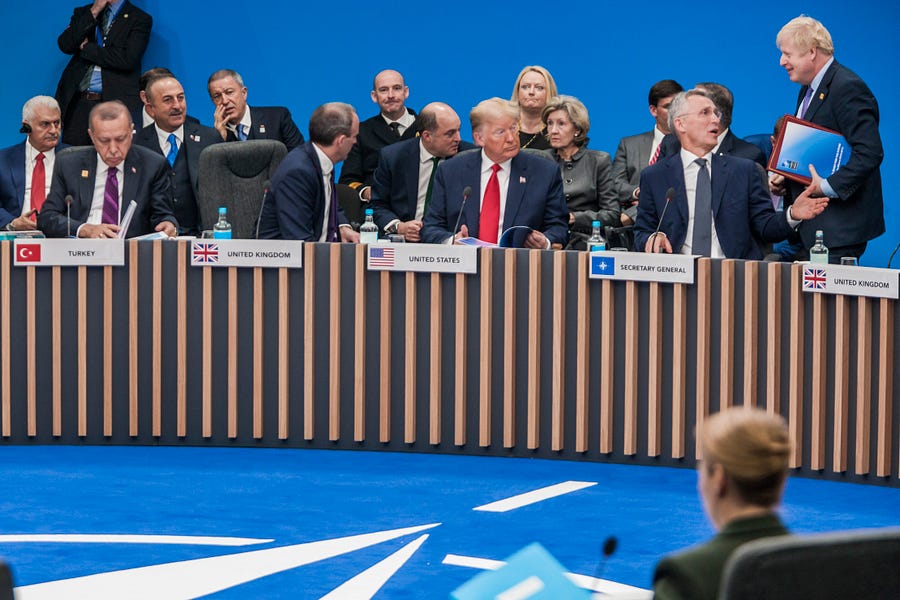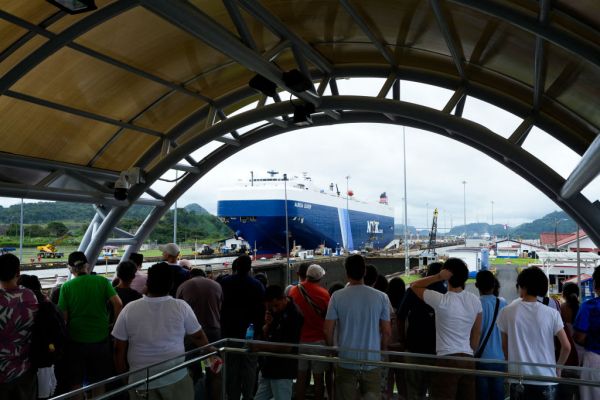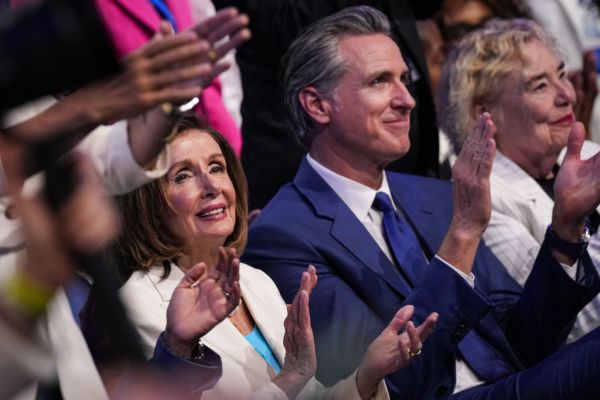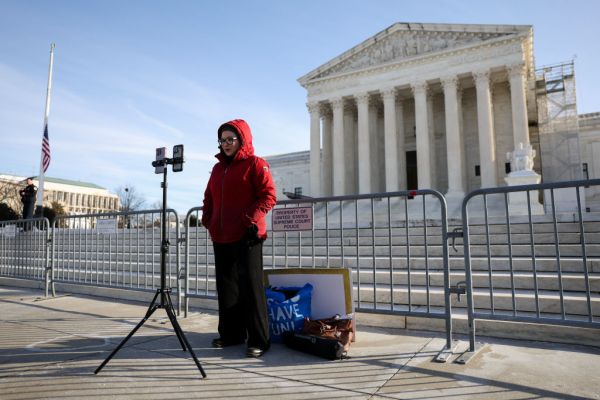Last week, President Donald Trump lambasted the World Health Organization (WHO) coronavirus performance in stark and explicit terms. “The W.H.O. really blew it,” Trump tweeted. “For some reason, funded largely by the United States, yet very China centric.” Indeed. The Chinese campaign to dominate U.N. agencies has been well-documented, and extends beyond the WHO to the International Civil Aviation Organization (ICAO), the recent and failed effort to take over the World Intellectual Property Organization (WIPO), its now notorious stewardship of Interpol, and more. But the China problem that has been exposed so dramatically as a result of the pandemic is actually just a subset of a larger and more serious one. Much of the global infrastructure built in the wake of World War II—think the United Nations, NATO, the World Bank, and the European Union—is aged, sclerotic, corrupt, and incapable of addressing the challenges of the 21st century. The COVID-19 pandemic should be an inflection point for the world, a wake-up call to revisit and reform that infrastructure for the 21st century.
If World War I shattered the 19th-century British, French, and German imperial world order, the end of World War II and the onset of the Cold War shortly thereafter brought its re-consolidation under the leadership of the United States. And there should be no question that that leadership ushered in the most prosperous age in human history. But it also froze in time certain anachronisms. The UN Security Council has 10 rotating members, and five veto-wielding permanent members that include the Allied powers that won, or claimed some part in winning World War II—the United States, the Soviet Union (now Russia), France, the United Kingdom, and the Republic of China (now the People’s Republic of coronavirus fame). What about Japan? Germany? Well, they lost, apparently forever. India? Part of the British Empire.
Similarly, NATO consolidated in 1949, eventually adding Greece, Turkey, and then Germany in 1955. France was in and out and in again, the Soviet Union collapsed, former members of the ex-Warsaw Pact joined, and the organization agreed, sort of, on the occasional wisdom of so-called out-of-area operations. But repeated efforts to remind members of the importance of NATO as a defense pact—its actual and original purpose—have faltered in recent decades. Most members don’t spend near the pledged 2 percent of their GDP on defense, and there are real questions about their commitment to the principles underlying the organization, underscored by Turkey’s recent purchase of Russia’s NATO-killer S400 air defense system.
Then there’s the European Union, born originally with a view to ending the age of European conflict. And to be fair, Europe has not gone to war since the end of World War II; the EU has delivered integration once unthinkable. But the rise of European populists, crushing imbalances in economic and foreign policy, a drift away from democracy among new members (ahem Hungary), and Brexit also underscore the fragility of the EU in its current form.
There’s more: The World Bank and International Monetary Fund, created by the Bretton Woods Agreement as World War II still raged, are showing their age. The World Bank went through a disastrous and demoralizing “reform” under Obama administration appointee Jim Yong Kim, and is now weathering yet another scandal over the axing of a large part of its own anti-corruption team for being, you know, too anti-corruption. Ditto the IMF, which has been under assault by angry leftists (who don’t like the IMF’s perennial demands for privatization, austerity, and small government that are the hallmarks of IMF lending) and angry Third World leaders (see leftist arguments) for years. But neither has awakened to the challenge to their development and lending models from China, Saudi Arabia, and other wealthy and authoritarian states happy to finance projects in exchange for influence or lend for infrastructure projects with no apparent strings attached. (China now has a 99 year lease on a key strategic port in Sri Lanka after the South Asian nation was unable to pay back a loan; the PRC owns most of the debt owed by the government of the Djibouti, in the Horn of Africa. China now has a military base there. Suffice it to say, these are not U.S. or European lending practices.)
Part of the difficulty in upending post-war institutions is the difficulty of beating something with … nothing. (This should be a familiar problem, as the United States is confronting just that dilemma with China’s 5G effort.) The consensus created by the twin crises of the war against Germany and Japan, and Stalin’s march westward in the immediate aftermath was unprecedented. And the fact that almost no major nation except the United States escaped the war largely intact put all the marbles in Washington’s hands. Those marbles are now well dispersed, and even 9/11 did not create a crisis long-lasting enough to allow for a major reinforcement of global institutions. (To the contrary in some cases: While the first invocation of NATO’s Article 5 initially restored lagging faith in the North Atlantic alliance, it quickly became evident that few of the nations stepping up actually had any real military capability.)
The question is, can the coronavirus shock the world enough to begin a recalibration? Enough to ask ourselves, for example: Should there be a global health organization made up only of responsible, transparent, democratic nations? Should there be a global security alliance, or group of alliances, of democracies that will not invade and annex vast swaths of other nations’ territory? Should there be international development and lending institutions capable of adapting to compete with predacious efforts like China’s Belt and Road initiative? Should there be trading alliances in which members respect intellectual property and the international rules of the road? Should customs unions like the EU have rules about adherence to democratic norms and principles? What about NATO?
The answer to all of these questions is yes. But that requires not simply a vision about a positive agenda and reform to existing institutions, it requires the kind of leadership that neither Donald Trump nor his predecessor were willing to ante up. Still, there are substitutes to presidential initiative. Congress has often—more often than recent presidents—stepped in to guide important change. It was Congress that led the way on NATO expansion; Congress that led the way on marginalizing Russia; Congress that forced the White House to renegotiate U.S. dues to the United Nations, and more.
Where to begin? The first is to forge a recognition that the status quo is unsustainable. A World Health Organization that serves Beijing is not what the U.S. taxpayer had in mind. So the United States must rethink dues to that organization until reforms are made that marginalize states that falsify health data. And it’s time to put the United Nations on notice that the U.S. will no longer fund specialized agencies like ICAO or WIPO or the Human Rights Commission that are headed by states inimical to the aims of those agencies. But it shouldn’t just be the United States; it will help in this and other projects to begin to gather a group of like-minded states—the U.K., Australia, others—who see the problem the same way.
Similarly, within NATO, continuing the pretense that NATO is a group of Western-oriented states is unacceptable when Recep Tayyip Erdoğan is playing footsie with Putin’s Russia. Some insist NATO cannot survive any bickering at the top, as it is already under strain from European leaders who hope to build a competing European Union military alliance. But allowing NATO’s destruction from within is simply a quieter way to allow the organization to collapse. And there are interim steps the United States can take to encourage reform. One is to begin discussion of amendments to NATO’s charter that contemplate expelling non-cooperating or anti-democratic member states.
In each instance, whether it’s the EU or the World Bank or another of the post-war pillars of the international order, adaptation and change are necessary for survival. The EU won’t last if its members cease paying in, cease observing democratic norms, and edge toward conflict with one another. The market principles the World Bank and the IMF once propagated without competition will weaken, and they risk being overtaken by regional fiefdoms that reject the open trading system that has transformed the world.
Failure to reform will eventually mean that the very instruments that made us at once prosperous and peaceful will fade in importance. And with their fading will go the prosperity and peace we have come to take for granted.
Photograph by Celestino Arce/NurPhoto via Getty Images.









Please note that we at The Dispatch hold ourselves, our work, and our commenters to a higher standard than other places on the internet. We welcome comments that foster genuine debate or discussion—including comments critical of us or our work—but responses that include ad hominem attacks on fellow Dispatch members or are intended to stoke fear and anger may be moderated.
With your membership, you only have the ability to comment on The Morning Dispatch articles. Consider upgrading to join the conversation everywhere.